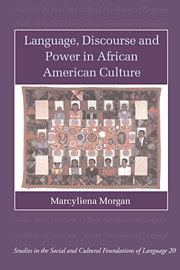Book contents
- Frontmatter
- Contents
- List of maps, figures and tables
- Acknowledgments
- Notes on the transcriptions
- Introduction
- 1 The African American speech community: culture, language ideology and social face
- 2 Forms of speech: verbal styles, discourse and interaction
- 3 Language norms and practices
- 4 When women speak: how and why we enter
- 5 Urban youth language: black by popular demand
- 6 Language, discourse and power: outing schools
- Notes
- References
- Index
- Studies in the Social and Cultural Foundations of Language
2 - Forms of speech: verbal styles, discourse and interaction
Published online by Cambridge University Press: 17 November 2009
- Frontmatter
- Contents
- List of maps, figures and tables
- Acknowledgments
- Notes on the transcriptions
- Introduction
- 1 The African American speech community: culture, language ideology and social face
- 2 Forms of speech: verbal styles, discourse and interaction
- 3 Language norms and practices
- 4 When women speak: how and why we enter
- 5 Urban youth language: black by popular demand
- 6 Language, discourse and power: outing schools
- Notes
- References
- Index
- Studies in the Social and Cultural Foundations of Language
Summary
When I was a teenager on the South Side of Chicago in the late 1960s, my interests in language and culture were cultivated by the songs and accompanying talk I heard billowing from apartment windows and cascading from the cocktail lounges that populated my neighborhood on 59th and State Street. One song in particular always conjures up “home” and the rich textures and complexities of adult black life. It is by Little Milton, who sings with truth and sincerity:
If I don't love you baby – Grits ain't grocery.
Chicken ain't poultry.
And Mona Lisa was a man.
The men and women in my neighborhood loved this song and applauded its recognition of the struggle between doing what one must do, would do, should do, could do and has to do, and doing what one is “gonna” do. Never believing that the binary revealed enough, the neighborhood employed an inventory of strategies to expose the mind/body/onlooker synergy. They understood these lyrics to be more than mere words, but rather the major unveiling of a truth about black life. How else can one explain the smiles that traveled across normally grimaced adult lips, the nodding of heads and the responses echoing throughout the neighborhood: “You tell it like it is! Talk that stuff!” and “You go on now – fool!” when Little Milton's pleading voice was heard.
- Type
- Chapter
- Information
- Publisher: Cambridge University PressPrint publication year: 2002



